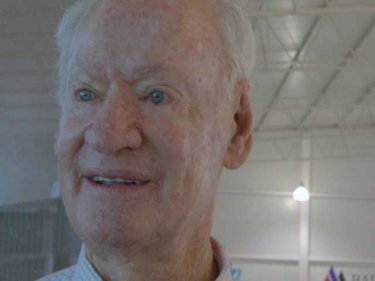Photo Album a must for King's Cup yachties
PASSION is what puts the wind in Rolly Tasker's sails. Despite a stormy and eventful life, over many decades he has given back as much to yachting as he has taken.
His achievements both on sea and land are probably not as well known as they deserve to be, both on Phuket and in his homeland, Australia.
But a newly-released biography by Australia's finest sports biographer will change all that. As the blurb for the book says: ''In more than 60 years of competition Rolly Tasker never lost a yacht, a crew, or a rig, or retired from gear failure in more than 2000 races.''
Rolly Tasker has retired from competitive sailing but his influence and impact on the sport worldwide still billows like a big sail in a strong breeze.
Tasker's varied and adventurous life has been captured by bestselling author Roland Perry in Sailing to the Moon, The biography of Rolly Tasker, Australia's greatest all-round yachtsman.
Again, the book's cover tells it well: ''During his career he sailed further than the distance to the moon and was a consistent winner in Australia and internationally in everything from small yachts to Maxis.''
Aged 82, Tasker, a silver medal winner at the 1956 Olympics and world champion in two different sailing classes, is still driven to win.
Today his competitive spirit and meticulous attention to detail are being applied to making sails on Phuket.
Rolly Tasker is not interested in just selecting fabric and stitching seams. He wants to make the greatest sails ever, in the largest production factory of its kind, using the best materials and the most technologically-advanced equipment.
He is now at the helm of a 100,000-square-foot production facility in central Phuket that exports sails, riggings and fittings to more than 60 countries, under his name.
The large white sailmaking loft is a far cry from his early days in Phuket. In 1994, he and his wife Kerry set up shop on the eighth floor of the car park at Phuket Shopping Centre, after failing to find a suitable space elsewhere on the island.
Like many events in Rolly Tasker's life, vividly described in the biography, this Phuket venture was beset with controversy and challenge.
He invested in a sailmaking loft in Pattaya in 1990, found suitable managers, and went to live with Kerry in San Diego.
The couple settled into the California sailing scene and also opened an art gallery to display his large collection of America's Cup prints.
The Pattaya operation, meanwhile, was falling apart under bad management and possible financial misdealing, forcing the couple to return to Thailand to undertake a rescue in 1994.
Tasker says they moved the whole kit and kaboodle 1000km south to Phuket.
After five months 52 women had been hired to work at the car park loft and within 14 months he had recovered the money he had lost in Pattaya, Tasker told Phuketwan.
The biography explains how he and Kerry rebuilt the company together from scratch. In Kerry, his third wife, Tasker found his perfect match for the next stage of his life as his passion turned from sail racing to business enterprise.
The couple met a decade earlier, in 1984, just as Tasker was suffering the painful end of his second marriage and Kerry was mourning the loss of her husband, who drowned in a storm while sailing.
Rolly Tasker Sails now employs about 150 workers, most of them women.
''I'm the only sailmaker that has girls,'' says Tasker. ''They can do everything; you can see their handiwork.''
As many as 80 sails are made each day, and at the height of production the vast factory floor is a sea of colour as the sails move along the left-to-right path towards the shipping exit, where they taken to be loaded onto flights each day at 4pm.
The whole operation is in full view of Tasker's desk, which sits in a glass-fronted office together with other managers. As he stands in front of the window to talk with customers, his piercing eyes dart across every meter of the huge expanse.
His desk is also the closest to the front entrance, and the door is wide open.
On the eve of this year's first King's Cup race, he welcomes a bevy of sailors eager to talk with him about their torn sails.
And, unheard for a large business these days, when you phone in and ask to speak to Rolly Tasker, you're put right through.
You get the sense that he hates to miss anything, even calls from strangers.
Tasker, a showman as well as a sportsman, offers instructions on the correct way to photograph his factory floor.
''You've got to wait 20 minutes. Every 20 minutes, every sail moves, and the whole thing changes.
''You don't take a photo until you think about it first. It's the same as when I'm in a race and there's a wind change over there and somebody shouts that we should tack now.
''Don't tack. Wait. Work it out and wait. Wait five seconds until you get into a better position, then tack. Otherwise you run into more trouble . . . You see what I mean? That's what it's all about.''
His exacting standards have carried over to all aspects of life, including his self-designed, self-built yachts, like the one he sailed at the Melbourne Olympics, as well as his business and racing adventures.
Westerners with Rolly Tasker's mindset living in Phuket tend to either mellow out or grow bitter over time at the slower pace of life here.
Tasker is unlikely to ever embrace or understand the Thai concept of sabaai (laid-back, happily relaxed) and seems to have come through the other side of his 14 years here with both his relentless perfectionism and sanity intact.
That's a fine balance few have achieved, but which he seems to have honed just as finely as the measurements of his sailing craft to make it work.
He acknowledges that he is not an easy man to work for.
''I'm pretty ruthless when it comes to my crew'', he says, after sending two staff members sprinting around the factory to find a particular sail he wants to see.
''I had the same crew most of my life,'' he says, ''and at one stage I think 11 of my crew got divorced because it was either the family or me, and they always chose me.
''We used to take off for anywhere in the world and I paid all the expenses; I never had a sponsor in my life.''
And how did he pay for his sailing adventures?
''Work,'' he says.
Yet those who know Tasker say that there are some malleable bits beneath that tough hull, and that he is remarkably generous in lending a hand or money when any of his staff are having difficulty.
In return he has built up a loyal team. Some of those he hired for his car park loft are still with him today.
He donates dinghy sails to a sailing club for handicapped children in Perth.
Not only have some 600 sails been provided so far, but each has a unique, colourful design so that parents can more easily spot their child's craft out on the water.
Tasker's life has been beset with challenges, both on and off the water, which he has met with the same no-nonsense approach.
His daughter Lee-Anne passed away in 2002 after a long battle with anorexia nervosa, and he has been living with skin cancer for more than half his life.
As a sailor he refused to wear protective gear or creams, insisting that he needed to face the wind unhindered so that he could get a full sense of the breezes as he raced.
About how Tasker lives with the disease, which will never go away and has required more than 100 surgical operations on his face alone, Roland Perry writes: ''It must concern him, and he would be inhuman if it did not.
''But life's challenges are so important to him that he can keep getting treatment and push it aside. Tasker has too much to do; too much to achieve. It was another reminder of his father Percy's reaction to losing a leg in war. Bad luck yes, but he was alive.
''His attitude was to adjust, get on, and to put it behind him.''
Tasker says that the 332-page biography only covers ''about 15 to 20 percent'' of his life, a life that shows no sign of slowing.
Earlier this year, he opened the Australian Sailing Museum in Mandurah, Western Australia, which contains his extensive collection of sailing memorabilia, models and art, including the world's only complete set of illustrations of all of the yachts that have ever sailed in the America's Cup.
As well as constantly innovating and improving on his existing Phuket operation, another loft in another country is in its early planning stages.
''I've never considered stopping,'' says Tasker. ''I never once pulled out of a race.''
The book, priced at $39.95 (Australian) is available online.
Look for more great sailing articles all week on Phuketwan









